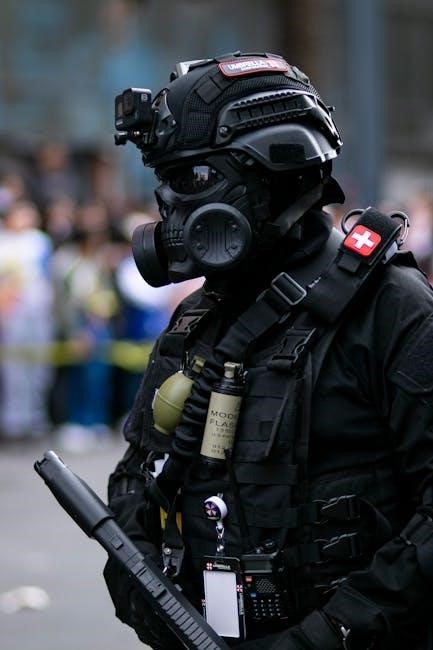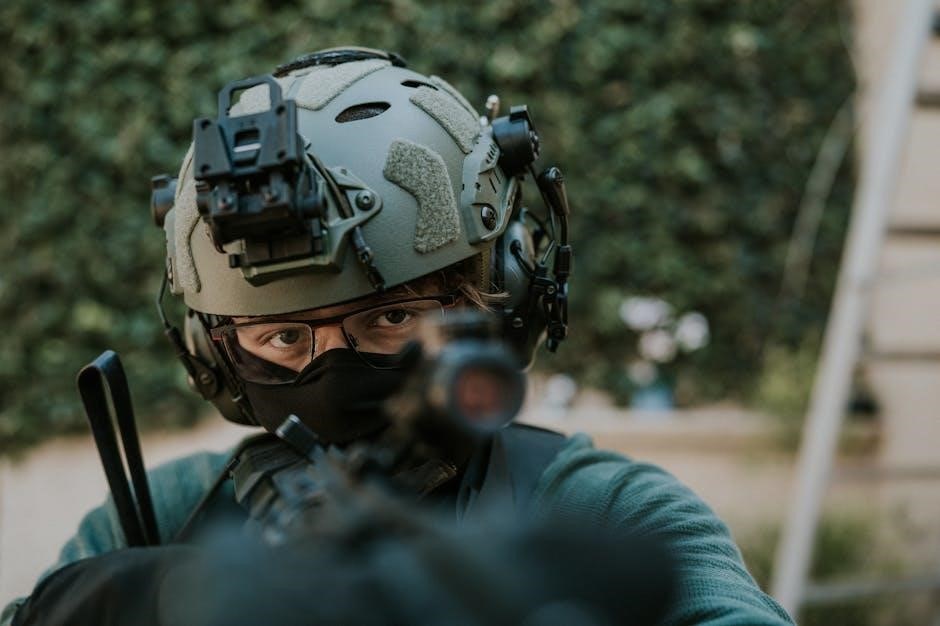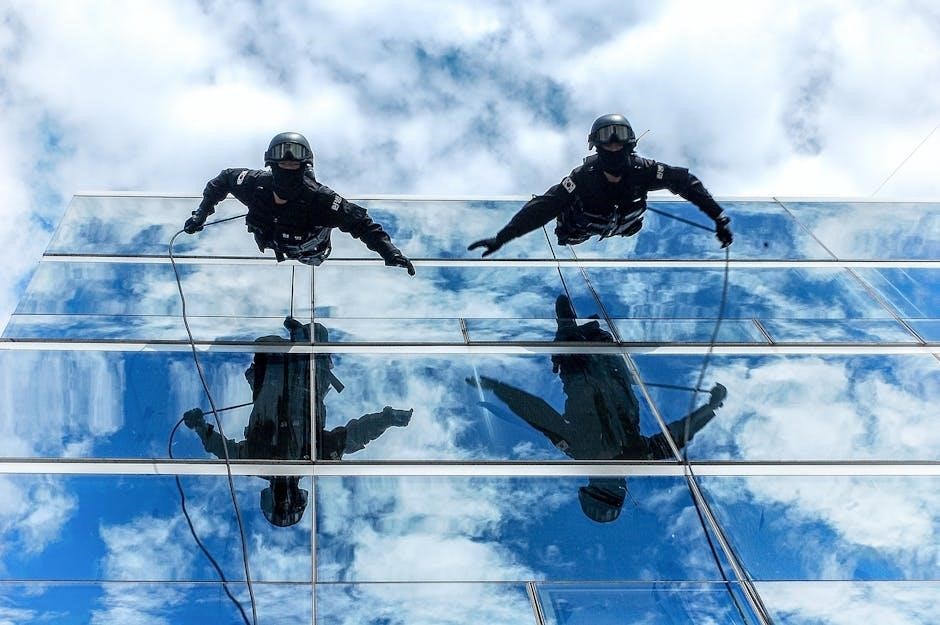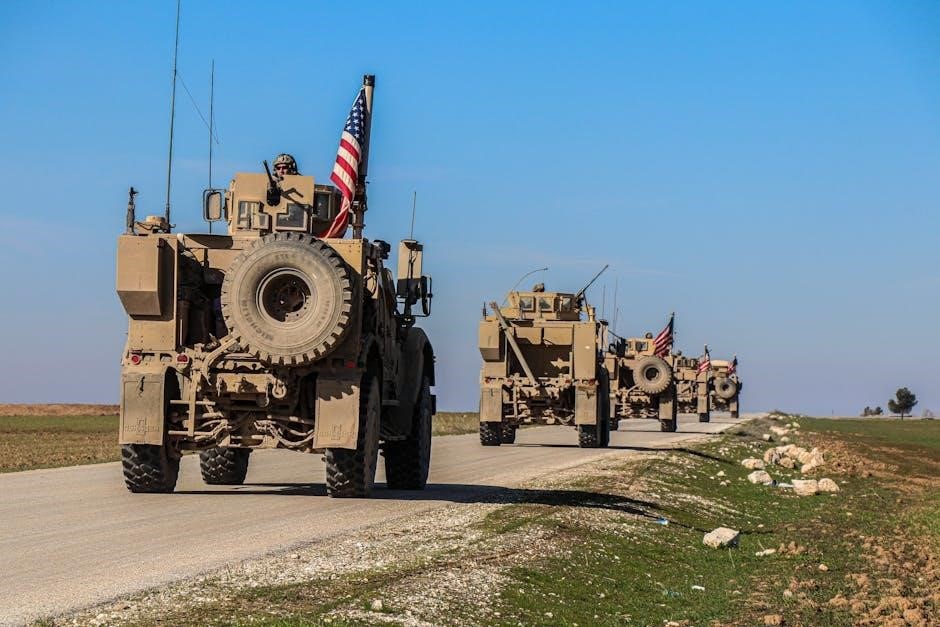Historical Background of Special Forces
Special Forces trace their origins to the early 20th century‚ evolving from elite units formed during World War II. The concept gained prominence post-war‚ with formal structures emerging in the late 20th century. France established its modern Special Forces in 1997 with the Groupement Special Autonome (GSA)‚ expanding their role in global counter-terrorism and unconventional warfare. Historical missions highlight their adaptability and strategic importance in modern military operations worldwide.
1.1. Origins and Evolution of Special Forces
Special Forces originated in the early 20th century‚ influenced by World War II elite units. France formalized its modern Special Forces in 1997 with the Groupement Spécial Autonome (GSA)‚ marking a structured evolution. Their role expanded post-war‚ focusing on counter-terrorism and unconventional warfare‚ adapting to global security challenges and emerging threats.
1.2. Key Historical Missions and Operations
French Special Forces engaged in pivotal missions globally‚ notably in the Sahel and Levant regions. Operations involved counter-terrorism efforts‚ such as neutralizing high-value targets and conducting discreet infiltrations. Their actions demonstrated strategic adaptability and effectiveness in addressing asymmetric threats‚ solidifying their role in modern military strategy and international security operations.

Roles and Responsibilities of Special Forces
Special Forces conduct counter-terrorism‚ intelligence gathering‚ and unconventional warfare. They train allied forces‚ operate in hostile regions like the Sahel and Levant‚ and execute strategic missions to ensure global security.
2.1. Counter-Terrorism and Direct Action
Special Forces excel in counter-terrorism and direct action‚ employing precision strikes and covert operations. They neutralize high-value targets and disrupt terrorist networks‚ as seen in recent missions in the Sahel and Levant regions‚ ensuring global security through decisive and strategic interventions.
2.2. Special Reconnaissance and Intelligence Gathering
Special Forces conduct advanced reconnaissance and gather critical intelligence‚ often in hostile environments. Using specialized skills and technology‚ they identify threats‚ monitor adversaries‚ and provide actionable insights. Their operations in regions like the Sahel and Levant highlight their expertise in human intelligence and surveillance‚ enabling strategic decision-making and effective mission planning.
2.3. Unconventional Warfare and Training of Allied Forces
Special Forces excel in unconventional warfare‚ employing guerrilla tactics and irregular strategies. They train allied forces globally‚ enhancing local military capabilities. From counter-insurgency in the Sahel to joint operations in the Levant‚ their expertise fosters international collaboration and strengthens partner nations’ defenses‚ ensuring long-term security and stability in conflict zones worldwide.

Training and Selection Process
Special Forces undergo rigorous selection‚ including 9 days of intense trials. Training focuses on survival‚ tactics‚ and advanced skills‚ ensuring operatives are elite and mission-ready.
3.1. Physical and Mental Challenges in Selection
Selection for Special Forces involves extreme physical and mental trials‚ including survival skills and strategic thinking. Candidates face rigorous tests that push their limits‚ with failure often resulting in severe consequences or dismissal.
3.2. Advanced Training Programs and Skills Development
Advanced training emphasizes specialized skills like counter-terrorism‚ intelligence gathering‚ and unconventional warfare. Programs include tactical simulations‚ language proficiency‚ and the use of cutting-edge technology‚ ensuring operatives are equipped to handle diverse and high-stakes missions effectively across the globe.
3.3. Importance of Teamwork and Leadership
Teamwork is critical in Special Forces‚ where missions rely on seamless coordination and trust among members. Effective leadership fosters resilience‚ adaptability‚ and decision-making under pressure‚ ensuring collective success in high-stakes environments. Strong leadership also cultivates a culture of accountability and collaboration‚ essential for overcoming complex operational challenges.

Equipment and Technology
Special Forces utilize advanced weaponry‚ surveillance drones‚ and specialized vehicles for covert operations. Cutting-edge technology enhances mission capabilities‚ ensuring precision and adaptability in diverse operational environments.
4.1. Advanced Weaponry and Gear
Special Forces employ cutting-edge weaponry‚ including precision sniper rifles‚ silenced pistols‚ and versatile assault rifles. They utilize advanced gear such as night vision devices‚ thermal imaging‚ and secure communication systems‚ enabling precision and adaptability in covert operations. This equipment is tailored to enhance mission effectiveness across diverse environments and scenarios.
4.2. Use of Drones and Surveillance Technology
Special Forces leverage advanced drones and surveillance systems for real-time intelligence gathering and reconnaissance. These technologies enhance mission planning‚ allowing precise targeting and minimizing risks. Drones also enable discreet monitoring in hostile territories‚ providing critical battlefield insights without direct engagement‚ thus improving operational effectiveness and strategic decision-making in modern warfare scenarios.
4.3. Specialized Vehicles and Transportation
Special Forces utilize tailored vehicles designed for stealth‚ mobility‚ and resilience in extreme environments. These include all-terrain trucks‚ fast insertion boats‚ and advanced helicopters. Such assets ensure rapid deployment and extraction‚ enabling operations in remote or hostile areas while maintaining operational readiness and tactical advantage in diverse mission scenarios globally.
Real-World Operations and Case Studies
Special Forces conduct high-stakes missions globally‚ such as counter-terrorism operations in the Sahel and Levant regions. Recent engagements include the French intervention on the Wabaria bridge in Mali‚ showcasing their adaptability and precision in hostile environments.
5.1. Recent Missions in the Sahel and Levant Regions
Special Forces have been heavily engaged in counter-terrorism operations across the Sahel and Levant. Recent missions include French interventions in Mali‚ where they neutralized threats on the Wabaria bridge. These operations highlight their adaptability and strategic impact in addressing emerging security challenges in volatile regions.
5.2. High-Profile Operations and Their Outcomes
Special Forces have conducted numerous high-profile operations‚ demonstrating their precision and effectiveness. A notable example includes neutralizing a pickup truck laden with explosives in Mali‚ showcasing their ability to mitigate high-stakes threats. These operations often result in the elimination of key adversaries‚ enhancing regional security and underscoring their critical role in counter-terrorism efforts globally.
5.3. Lessons Learned from Past Engagements
Engagements in regions like Mali and the Levant have highlighted the importance of precise intelligence and adaptability. Past operations revealed vulnerabilities in rapid response and coordination‚ leading to enhanced training protocols and improved strategic planning. These lessons underscore the evolution of Special Forces’ tactics‚ ensuring greater operational efficiency and effectiveness in future missions.
International Collaboration and NATO Involvement
Special Forces collaborate closely with NATO allies‚ conducting joint operations in regions like the Sahel to counter emerging threats. This partnership enhances global security through shared strategies and operational excellence.
6.1. Joint Operations with Allied Forces
Special Forces engage in joint operations with NATO allies‚ enhancing interoperability in missions across the Sahel and Levant. These operations combine expertise‚ ensuring a unified response to global threats‚ fostering trust‚ and maximizing operational effectiveness in diverse conflict zones.
6.2. Role of Special Forces in NATO Missions
NATO Special Forces are integral to alliance missions‚ providing specialized skills in counter-terrorism and unconventional warfare. They lead training programs for partner nations‚ strengthening regional security. Their role emphasizes interoperability and strategic coordination‚ ensuring effective responses to emerging threats within NATO’s operational framework.
6.3. Sharing Strategies and Best Practices Globally
International collaboration enables Special Forces to share tactics and strategies‚ enhancing global security. Seminars like Sofins foster innovation‚ connecting creators and users of specialized equipment. Digital platforms and joint exercises further facilitate knowledge exchange‚ ensuring adaptability and unity in addressing modern threats.

Challenges and Controversies
Special Forces face ethical dilemmas‚ public scrutiny‚ and balancing secrecy with transparency. Their operations often spark debates on accountability and the moral implications of covert actions.
7.1. Ethical Considerations in Special Operations
Special Forces often operate in morally ambiguous environments‚ raising ethical concerns. Covert missions‚ potential civilian casualties‚ and extreme measures taken during operations challenge traditional military ethics and accountability standards‚ prompting debates on justice and the limits of unconventional warfare tactics.
7.2. Public Perception and Media Coverage
Public perception of Special Forces is often shaped by media portrayals‚ which frequently romanticize their operations. However‚ this can create misconceptions‚ as the reality of their work is far more complex and nuanced. Media coverage also struggles to balance secrecy with transparency‚ impacting how the public views their role and effectiveness.
7.3. Balancing Secrecy and Transparency
Special Forces operations often require secrecy to ensure mission success and protect sensitive information. However‚ maintaining transparency with the public and government is crucial for accountability. Striking this balance is challenging‚ as excessive secrecy can lead to mistrust‚ while too much transparency may compromise operational security and effectiveness. Trust must be carefully cultivated.

Media Portrayal vs. Reality
Media often portrays Special Forces as action heroes‚ but reality focuses on strategic operations‚ discipline‚ and precise execution‚ contrasting with Hollywood’s dramatized version of their missions.
8.1. How Movies and Video Games Influence Public Image
Movies and video games often portray Special Forces as action-packed superheroes‚ emphasizing dramatic scenarios and individual heroism. This creates a distorted public image‚ glorifying their roles while overshadowing the realities of their disciplined‚ strategic‚ and often dangerous missions.
8.2. Misconceptions About Special Forces
Many view Special Forces as invincible heroes due to media portrayals‚ but this overshadows their reality. They are highly trained professionals‚ not invincible‚ often facing life-threatening scenarios. The glamour of missions is misrepresented‚ hiding the discipline and risks involved in their critical roles.
8.3. The Reality of Special Forces Operations
Special Forces operations are marked by precision‚ secrecy‚ and high stakes. Unlike Hollywood depictions‚ real missions emphasize teamwork‚ strategic planning‚ and adaptability. Operations often involve covert entries‚ intelligence gathering‚ and discreet exits‚ highlighting the balance between stealth and force. The reality is far more complex and less glorified than popular portrayals suggest.

Future Trends and Modernization
Special Forces are integrating advanced technologies like AI‚ robotics‚ and cyber capabilities to enhance operations. Modernization focuses on adapting to emerging threats and leveraging cutting-edge tools for strategic advantage.
9.1. Integration of AI and Robotics
Special Forces are increasingly incorporating AI and robotics to enhance operational efficiency. Drones and autonomous systems enable precision strikes‚ surveillance‚ and logistics support‚ reducing risks and improving mission outcomes significantly.
9.2. Cyber Warfare and Its Impact on Special Operations
Cyber warfare poses significant challenges for Special Forces‚ targeting communication systems and operational security. It disrupts mission planning and execution‚ requiring advanced countermeasures to protect sensitive data and maintain operational integrity in an increasingly digital battlefield.
9.3. Adapting to Emerging Global Threats
Special Forces are evolving to counter diverse threats like cyber attacks‚ irregular warfare‚ and asymmetric conflicts. They employ advanced tactics‚ intelligence‚ and technology to stay ahead of adversaries. Collaborative efforts with allies enhance their ability to address dynamic security challenges effectively‚ ensuring readiness for future uncertainties and maintaining global stability.
Key Literature and Resources
- Recommended books on Special Forces include historical analyses and operational insights.
- Academic studies and research papers provide in-depth strategic and tactical perspectives.
- Online resources and documentaries offer practical knowledge and real-world applications.
10.1. Recommended Books on Special Forces
Key literature includes “Les forces spéciales : concept et histoire” and “Forces spéciales 1.pdf”‚ offering insights into their historical development and operational strategies. Additional recommended titles like “The Art of War” by Sun Tzu and “On Guerrilla Warfare” by Mao Zedong provide foundational knowledge on unconventional tactics and military philosophy.
10;2. Academic Studies and Research Papers
Notable academic studies include “Forces spéciales : concept et histoire” and “FORCES SPÉCIALES : CONCEPT ET HISTOIRE‚” which explore their historical development and operational strategies. Other recommended papers focus on “The Evolution of Special Forces” and “Special Operations in Modern Warfare‚” offering in-depth analyses of their roles and impact.
10.3. Online Resources and Documentaries
Key online resources include “FORCES SPÉCIALES : CONCEPT ET HISTOIRE” and “Forces spéciales 1.pdf”‚ offering detailed insights into their history and operations; Documentaries like “Les Forces Spéciales en Action” provide visual narratives of their missions‚ while websites such as theatrum-belli.com host comprehensive PDF analyses on their strategic roles and global impact.

Public Perception and Support
Public perception of Special Forces is shaped by media‚ often contrasting reality with cinematic portrayals. National pride and support are strong‚ yet misconceptions persist‚ emphasizing the need for accurate information and transparency to foster understanding and trust in their critical roles.
11.1; National Pride and Support for Special Forces
Special Forces inspire national pride due to their critical missions and sacrifices. Their effectiveness in counter-terrorism and global operations fosters widespread admiration. Public support is strengthened by their reputation as elite defenders of national security‚ embodying courage and professionalism. This pride is further reinforced through media coverage and shared stories of their heroism.
11.2. The Role of Media in Shaping Public Opinion
Media significantly influences public perception of Special Forces‚ often portraying them as heroic figures. While this fosters admiration‚ it can also create misconceptions. Movies‚ video games‚ and news coverage highlight their bravery but sometimes exaggerate their capabilities. This duality shapes public opinion‚ blending reality with fiction‚ impacting overall support and understanding of their missions.
11.3. Engaging with Civil Society and Transparency
French Special Forces engage with civil society through organized events like Sofins‚ showcasing their role and capabilities. These interactions foster transparency and public trust‚ balancing the need for secrecy with the importance of understanding their mission. Such efforts help bridge the gap between military operations and civilian awareness‚ enhancing overall support and cooperation.

Support and Logistics
Logistics play a crucial role in enabling Special Forces operations. Advanced equipment‚ specialized gear‚ and seamless supply chains ensure operational readiness. Support units are vital in maintaining effectiveness.
12.1. Importance of Logistics in Special Operations
Logistics is critical for Special Forces‚ ensuring operational readiness and sustainability. Specialized equipment‚ secure supply chains‚ and strategic planning enable rapid deployment and mission execution. Innovations in logistics‚ as seen in events like Sofins‚ enhance operational capabilities‚ showcasing the vital role of logistics in modern special operations;
12.2. Role of Support Units and Personnel
Support units and personnel are essential for Special Forces operations‚ providing critical assistance in logistics‚ intelligence‚ and medical care. From equipment maintenance to strategic planning‚ these teams ensure seamless mission execution. Their role is vital in enabling Special Forces to operate effectively in diverse and challenging environments‚ enhancing overall mission success and readiness.
12.3. Ensuring Operational Readiness
Operational readiness is maintained through rigorous training‚ advanced equipment‚ and streamlined logistics. Special Forces units undergo continuous exercises and simulations to stay prepared for diverse missions. Regular updates in technology and tactics ensure they remain capable of responding swiftly and effectively to emerging threats‚ ensuring peak performance in critical situations worldwide.
